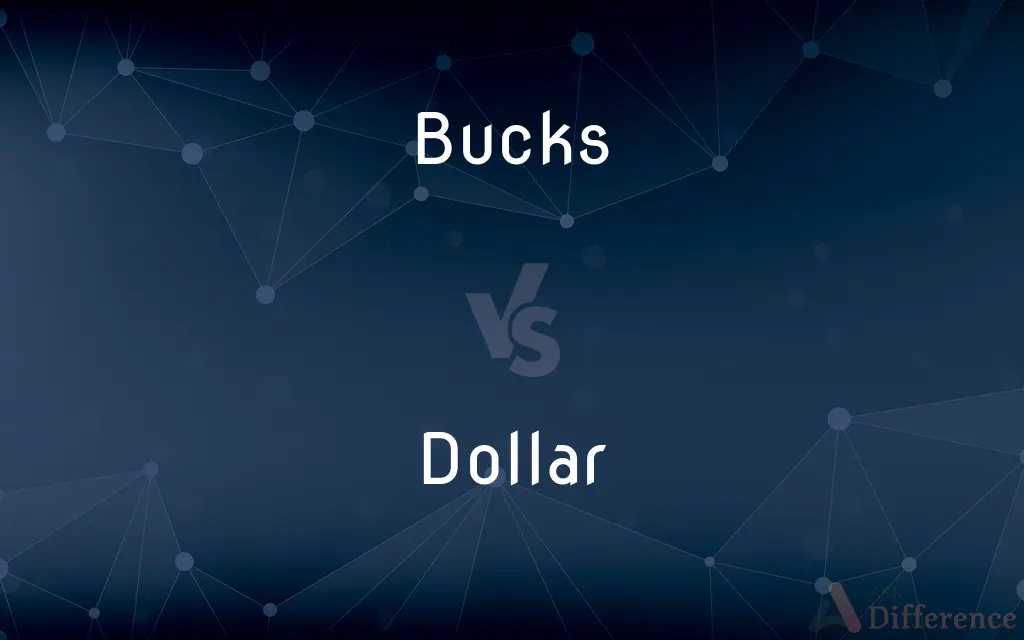Bucks vs. Dollar — What's the Difference?
Edited by Tayyaba Rehman — By Fiza Rafique — Updated on April 15, 2024
Bucks and dollars refer to the same U.S. currency; "bucks" is slang for "dollars," often used informally, while "dollar" is the official terminology.

Difference Between Bucks and Dollar
Table of Contents
ADVERTISEMENT
Key Differences
Bucks is a colloquial term commonly used in everyday American English to refer to money, specifically U.S. dollars. On the other hand, the term "dollar" is the official name for the currency used in the United States and other countries, denoting a more formal usage.
The use of "bucks" adds a casual or informal tone to conversations about money, suggesting familiarity or a non-official context. Whereas, "dollar" is used in more formal settings such as financial reports, legal documents, and official communications.
In speech and informal writing, people often use "bucks" to convey amounts quickly and casually, such as saying "twenty bucks" instead of "twenty dollars." Conversely, in formal writing and official speeches, "dollars" is preferred to maintain the formality of the communication.
The slang "bucks" can sometimes confuse non-native speakers or those unfamiliar with American slang, as it doesn't obviously relate to money without prior knowledge. On the other hand, "dollar" is universally recognized and understood in its reference to currency.
While "bucks" is specific to the U.S. currency context, "dollar" is used in multiple countries around the world, each having its own version of the dollar, such as the Canadian dollar or Australian dollar. This makes "dollar" a more globally recognized term.
ADVERTISEMENT
Comparison Chart
Formality
Informal
Formal
Usage Context
Casual conversations
Official documents
Recognition
U.S.-centric slang
Internationally known
Associated Countries
United States
Multiple countries
Typical Usage in Speech
Frequent
Less frequent
Compare with Definitions
Bucks
Informal term for U.S. dollars.
I spent fifty bucks on groceries.
Dollar
Represents legal tender for all debts, public and private.
The contract is worth thousands of dollars.
Bucks
Colloquial way of referring to dollars among friends.
Can you lend me twenty bucks until tomorrow?
Dollar
Indicates precision and legality in financial discussions.
He declared assets worth several million dollars.
Bucks
Often used in spoken American English.
We need a couple more bucks for the tickets.
Dollar
Used formally in economics and finance.
The dollar strengthened against the euro.
Bucks
Used to express amounts in informal settings.
They raised hundreds of bucks for charity.
Dollar
Also refers to currency units in other countries.
Australian dollars are used down under.
Bucks
Slang for money in a casual context.
She owes me ten bucks from last week.
Dollar
The official currency unit of the United States.
The item costs thirty dollars.
Bucks
A male deer.
Dollar
Dollar (symbol: $) is the name of more than 20 currencies. They include the Australian dollar, Brunei dollar, Canadian dollar, Hong Kong dollar, Jamaican dollar, Liberian dollar, Namibian dollar, New Taiwan dollar, New Zealand dollar, Singapore dollar, United States dollar, and several others.
Bucks
The male of various other mammals, such as antelopes, kangaroos, mice, or rabbits.
Dollar
See Table at currency.
Bucks
Antelope considered as a group
A herd of buck.
Dollar
A coin or note that is worth one dollar.
Bucks
A robust or high-spirited young man.
Dollar
Any of various historical silver coins similar to the taler, such as a piece of eight.
Bucks
A fop.
Dollar
Money spent or available to be spent
Boardwalk shops competing for the tourist dollar.
Bucks
(Offensive) A Native American or black man.
Dollar
Official designation for currency in some parts of the world, including Canada, the United States, Australia, New Zealand, Hong Kong, and elsewhere. Its symbol is $.
Bucks
An act or instance of bucking
A horse that unseated its rider on the first buck.
Dollar
(by extension) money generally.
Bucks
Buckskin.
Dollar
A quarter of a pound or one crown, historically minted as a coin of approximately the same size and composition as a then-contemporary dollar coin of the United States, and worth slightly more.
Bucks
Bucks Buckskin breeches or shoes.
Dollar
Imported from the United States, and paid for in U.S. dollars. (Note: distinguish "dollar wheat", North American farmers' slogan, meaning a market price of one dollar per bushel.)
Bucks
A sawhorse or sawbuck.
Dollar
(nuclear physics) A unit of reactivity equal to the interval between delayed criticality and prompt criticality.
Bucks
A leather-covered frame used for gymnastic vaulting.
Dollar
A silver coin of the United States containing 371.25 grains of silver and 41.25 grains of alloy, that is, having a total weight of 412.5 grains.
Bucks
(Informal) A dollar.
Dollar
A coin of the same general weight and value as the United States silver dollar, though differing slightly in different countries, formerly current in Mexico, Canada, parts of South America, also in Spain, and several other European countries.
Bucks
(Informal) An amount of money
Working overtime to make an extra buck.
Dollar
The value of a dollar; the unit of currency, differing in value in different countries, commonly employed in the United States and a number of other countries, including Australia, Canada, Hong Kong, parts of the Carribbean, Liberia, and several others.
Bucks
A large round amount of currency, especially a hundred dollars.
Dollar
The basic monetary unit in many countries; equal to 100 cents
Bucks
A hundred of some other units, especially miles per hour or pounds
Was doing a buck twenty out on the Interstate.
A boxer weighing in at a buck fifty.
Dollar
A piece of paper money worth one dollar
Bucks
(Games) A counter or marker formerly passed from one poker player to another to indicate an obligation, especially one's turn to deal.
Dollar
A United States coin worth one dollar;
The dollar coin has never been popular in the United States
Bucks
(Informal) Obligation to account for something; responsibility
Tried to pass the buck for the failure to his boss.
Dollar
A symbol of commercialism or greed;
He worships the almighty dollar
The dollar sign means little to him
Bucks
To leap upward while arching the back
The horse bucked in fright.
Bucks
To charge with the head lowered; butt.
Bucks
To make sudden jerky movements; jolt
The motor bucked and lurched before it finally ran smoothly.
Bucks
To resist stubbornly and obstinately; balk.
Bucks
(Informal) To strive with determination
Bucking for a promotion.
Bucks
To throw or toss by bucking
Buck off a rider.
Bucked the packsaddle off its back.
Bucks
To oppose directly and stubbornly; go against
“Los Angeles County, the most populous county in the country, is bucking the trend” (American Demographics).
Bucks
(Football) To charge into (an opponent's line) carrying the ball.
Bucks
To butt against with the head.
Bucks
To pass (a task or duty) to another, especially so as to avoid responsibility
"We will see the stifling of initiative and the increased bucking of decisions to the top" (Winston Lord).
Bucks
Of the lowest rank in a specified military category
A buck private.
A buck sergeant.
Bucks
Plural of buck
Bucks
Casual oxford shoes made of buckskin, often white or a neutral colour.
Common Curiosities
Can "bucks" be used in official documents?
No, "bucks" is informal and not appropriate for official documents; "dollars" should be used instead.
Do "bucks" and "dollar" have different values?
No, "bucks" and "dollar" refer to the same currency value; "bucks" is simply an informal term for "dollar."
What does "bucks" mean in financial terms?
"Bucks" is a slang term for dollars, typically used in informal settings.
Is "dollar" used internationally?
Yes, "dollar" refers to the official currency of the United States and is also used to describe the currencies of other countries like Canada and Australia.
Can "bucks" refer to currencies other than the U.S. dollar?
Typically, "bucks" refers specifically to U.S. dollars in slang.
What are examples of other countries using "dollar"?
Besides the U.S., countries like Canada, Australia, and Singapore use the term "dollar" for their currency.
How do non-native speakers perceive "bucks"?
Non-native speakers might find "bucks" confusing if they are not familiar with American slang.
What is the symbol for "dollar"?
The symbol for the dollar is "$."
Why is "bucks" popular in American slang?
"Bucks" is popular due to its ease of use in casual conversation and its entrenched presence in American culture.
How did "bucks" originate as slang for dollars?
"Bucks" likely originated from the frontier days, referring initially to deerskins used as trade items.
Are there contexts where "bucks" should be avoided?
Yes, in formal, professional, or international contexts, it's better to use "dollar."
How do businesses treat the term "bucks"?
Businesses, especially in informal advertising, might use "bucks" to appear more relatable.
What is the plural form of "dollar"?
The plural form is "dollars."
Is it correct to use "bucks" in academic writing?
No, academic writing requires formal language, so "dollar" should be used instead of "bucks."
Is there a difference in usage of "bucks" and "dollar" based on age or demographics?
Younger and more informal demographics tend to use "bucks" more frequently, whereas more formal or older demographics prefer "dollar."
Share Your Discovery

Previous Comparison
Gag vs. Gage
Next Comparison
Lapel vs. RevereAuthor Spotlight
Written by
Fiza RafiqueFiza Rafique is a skilled content writer at AskDifference.com, where she meticulously refines and enhances written pieces. Drawing from her vast editorial expertise, Fiza ensures clarity, accuracy, and precision in every article. Passionate about language, she continually seeks to elevate the quality of content for readers worldwide.
Edited by
Tayyaba RehmanTayyaba Rehman is a distinguished writer, currently serving as a primary contributor to askdifference.com. As a researcher in semantics and etymology, Tayyaba's passion for the complexity of languages and their distinctions has found a perfect home on the platform. Tayyaba delves into the intricacies of language, distinguishing between commonly confused words and phrases, thereby providing clarity for readers worldwide.












































